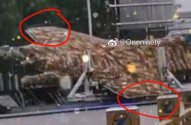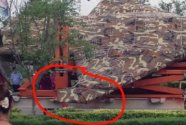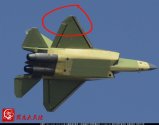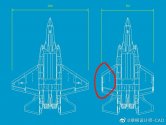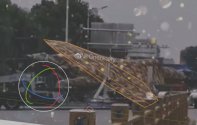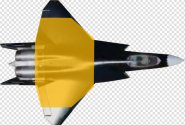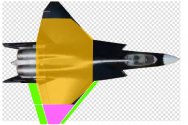You are using an out of date browser. It may not display this or other websites correctly.
You should upgrade or use an alternative browser.
You should upgrade or use an alternative browser.
Shenyang FC-31 / J-31 Fighter Demonstrator
- Thread starter RedSky
- Start date
- Status
- Not open for further replies.
Compared to 2012, the canopy looks one-piece and the flaps are attached, judging from the conformity of the tarp with the airframe.
Also, the back of the aircraft looks different and there seems to be a more pronounced ‘hump’ at the canopy section.
Conclusion: Not the same aircraft, at least the one being transported in 2012
Compared to 2012, the canopy looks one-piece and the flaps are attached, judging from the conformity of the tarp with the airframe.
Also, the back of the aircraft looks different and there seems to be a more pronounced ‘hump’ at the canopy section.
Conclusion: Not the same aircraft, at least the one being transported in 2012
Exactly my point!
Analysis: seems that only the outer portion of the foldable wing wasn’t attached.
View attachment 74400
View attachment 74401
View attachment 74402
I'm so confused, what's the point for doing this, if it is the new navel varient?shenyang can't do static test themselves?
the 2012 transportation thing in my understanding is just a big self-promotion for it to be shown in Zhuhai airshow, now rumors suggested that they have been selected by the PLAN, why SAC still do this? i mean comparing with j-20, we outsider knows very little before 2011...
It's not a static model. It is a flyable prototype. The J-20 could be transported in pieces whereas the FC-31 (J-31/35 now?) cannot since the fuselage and wing are crafted in one piece.I'm so confused, what's the point for doing this, if it is the new navel varient?shenyang can't do static test themselves?
the 2012 transportation thing in my understanding is just a big self-promotion for it to be shown in Zhuhai airshow, now rumors suggested that they have been selected by the PLAN, why SAC still do this? i mean comparing with j-20, we outsider knows very little before 2011...
ha? that's some funny speculations.It's not a static model. It is a flyable prototype. The J-20 could be transported in pieces whereas the FC-31 (J-31/35 now?) cannot since the fuselage and wing are crafted in one piece.
do you have any evidence to support your statements or implications?
- j-20 can seperate its fuselage into pieces and transport to yanliang for any test
- j-20 had transported to yanliang in road before
- fc-31 can't be transported in pieces?
Last edited:
The FC-31 project is partially a demonstrator for new manufacturing and production techniques. One of the innovations is that the whole fuselage skeleton from wing to wing is one fused single piece. If I recall correctly this is supposed to help improve the strength to weight ratio of the airframe, allowing for it to be lighter. The first FC-31 airframe we saw, all the way back in 2013 was shipped as a whole single piece, for this reason, so it follows that an iteration on that design would be handled similarly. There have been various articles of evidence talking about how the FC-31 put together. It’s even been briefly touched on in a documentary that talked about production improvements at SAC. Unless someone has aggregated these sources or kindly chooses to do this for you though, you’re going to have to dig around the forum archives.ha? that's some funny speculations.
do you have any evidence to support your statements or implications?
After all any reason why j-20 or fc-31 can't fly to yanliang? but a plane, rather disassembled and transported to yanliang by a track, and facing the sequence of been photoed in heavy trafficed highways.
- j-20 can seperate fuselage in pieces and transport to yanliang for test
- j-20 had transported to yanliang
- fc-31 can't be transported in pieces?
The FC-31 project is partially a demonstrator for new manufacturing and production techniques. One of the innovations is that the whole fuselage skeleton from wing to wing is one fused single piece. If I recall correctly this is supposed to help improve the strength to weight ratio of the airframe, allowing for it to be lighter. The first FC-31 airframe we saw, all the way back in 2013 was shipped as a whole single piece, for this reason, so it follows that an iteration on that design would be handled similarly. There have been various articles of evidence talking about how the FC-31 put together. It’s even been briefly touched on in a documentary that talked about production improvements at SAC. Unless someone has aggregated these sources or kindly chooses to do this for you though, you’re going to have to dig around the forum archives.
One other thing to add is that static test airframes are not flyable lol.
That's why the J-20 and FC-31 static test airframes couldn't "fly" to Yanliang, because they literally are not designed to fly.
@stannislas
- Status
- Not open for further replies.

